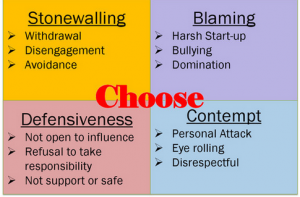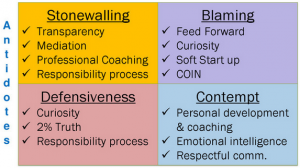[This post is one of many sparked by Agile 2015.]
The second game (click here for series start) is from Jake Calabrese‘s workshop “Benefiting from Conflict – Building Antifragile Relationships and Teams“.
It’s based on the belief that each of us has one default “toxic” = “less than helpful” behavior they fall back on in times of conflict and stress.
These 4 toxic behaviours are Stonewalling, Defensiveness, Blaming and Contempt.

In the original game, everybody writes down their default toxin on an “Hello, I’m …” sticker. Then you go about the room shaking people’s hands, each of you introducing themselves: “Hi, I’m Blaming.” “Nice to meet you Blaming, I’m Contempt.”
We were only 7, not 100 like in Jake’s session, so we “played” it differently. After writing down our main toxin someone suggested that the others try to guess yours, before you reveal it.
Disclaimer: You should only ever assess yourself, not others!
That being disclaimed, we were a fun little, high trust group and everybody opted-in into the other-assessment. So we did it, with very interesting results: For all but 2 (out of 7 people) self- and other-assessment were exact opposites!
For example, I’m a die-hard stonewaller. I’ll bite my tongue for a very long time until I finally erupt in frustration. The others pegged me for Blaming, Defensiveness and Contempt, but no vote for Stonewalling. These differing views were typical.
No clue, if that is because we’re really bad at self-assessment or assessing others or both. In my case the stonewalling is something I try hard to overcome at work, because I’ve seen that it leads nowhere. Nowhere nice, anyway. (In private I don’t try as hard, although it would be helpful.)
In fact, many of the participants remarked that they fall onto different toxins at work and at home. Or that the toxin depends on the person they have the conflict with. Interesting! I haven’t asked but would guess that it depends on the level of trust between the both of them.
Last observation: Although the label “defensiveness” seemed fitting for some people’s behaviors, the descriptions (“Not open to influence”, etc.) didn’t fit anyone. I wonder if we’ve got a different concept of “defensiveness” or if there’s just many more possible manifestations of it than the given 3.
After the assessments we talked briefly about the antidotes to the toxic behaviors:
Play this game during a team liftoff so that people will know what behaviour to expect of each other when the shit hits the fan. The game can also inform Working Agreements. You probably don’t need “We stay respectful” in a team of Stonewallers. How about “We openly address things that annoy us, even and especially, very small things”?
Thanks to Jake Calabrese for introducing us to team toxins!

